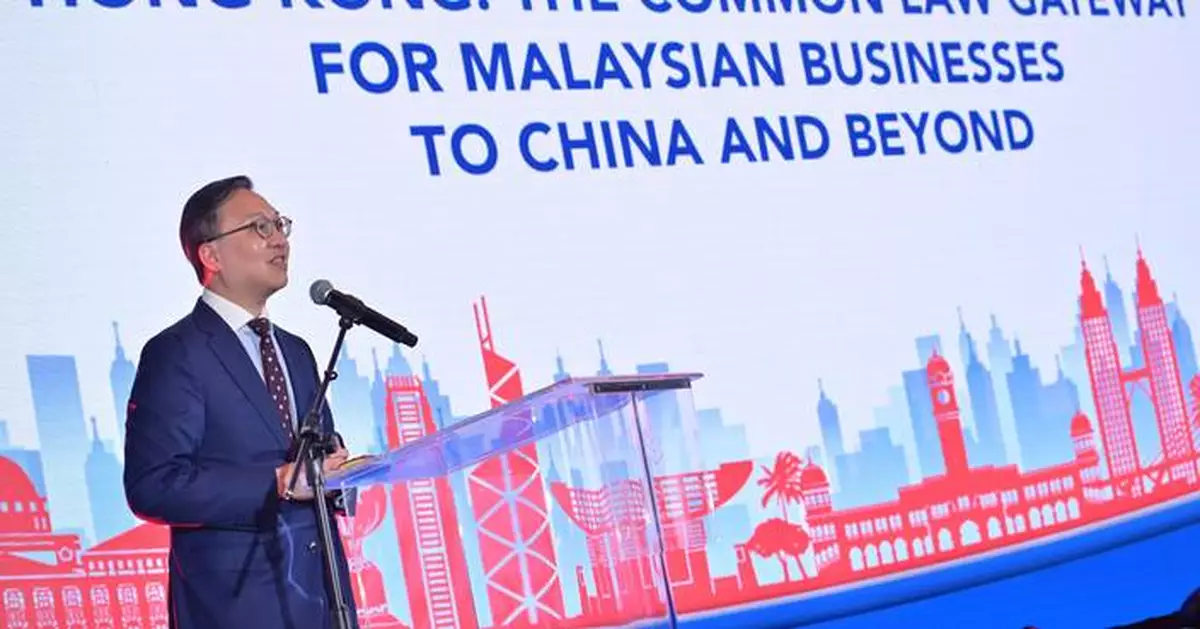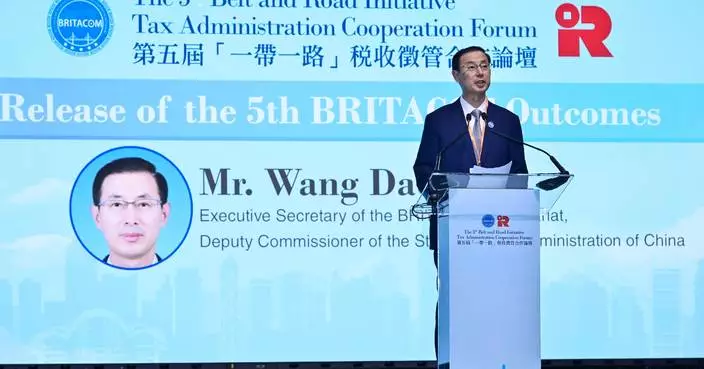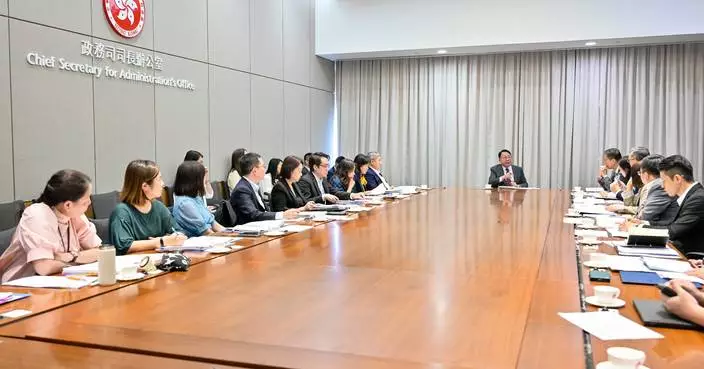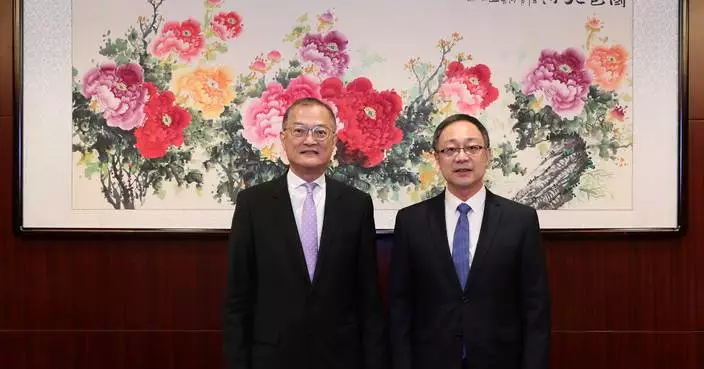Keynote address by SJ at seminar titled Hong Kong: The Common Law Gateway for Malaysian Businesses to China and Beyond in Kuala Lumpur, Malaysia
Following is the keynote address by the Secretary for Justice, Mr Paul Lam, SC, at the seminar titled Hong Kong: The Common Law Gateway for Malaysian Businesses to China and Beyond in in Kuala Lumpur, Malaysia, today (September 26):
Her Excellency Dato' Sri Azalina (Minister in the Prime Minister's Department (Law and Institutional Reform), Malaysia, Dato' Sri Azalina Othman Said), 鄭學方代辦 (Chargé d'Affaires of the Chinese Embassy in Malaysia, Mr Zheng Xuefang), Dato' Seri Gobalakrishnan (President, National Chamber of Commerce and Industry of Malaysia), ladies and gentlemen, distinguished guests,
I am very pleased to be here today. Firstly, I must thank all of you for joining our seminar. I was told that there are all together around 150 friends from Malaysia attending this event. It is a daunting task to speak right after such an eminent panel of speakers sharing their experiences and expertise.
I would like to begin by a very important fact. That is the relationship between China and Malaysia. The year of 2024 is extremely important because it marked the 50th anniversary of the establishment of the diplomatic ties between the two countries. I think the exact date was May 31, 1974. Fast forward, in June this year, the Premier of the People's Republic of China, Mr Li Qiang, visited Kuala Lumpur. On that occasion, he renewed a co-operation agreement between the two countries for another five years. And fast forward, not too long ago, I think less than two weeks ago on September 20, the King of Malaysia Sultan Ibrahim Iskandar went to Beijing and met President Xi Jinping. He described the trip as a great success. ASEAN is now the number one trading partner of China, and I understand that Malaysia is going to be the chairman of ASEAN in 2025. So I have no question whatsoever that the relationship between China and Malaysia and ASEAN will be taken to a new height in the very near future.
Now, returning to Hong Kong. Many speakers have already mentioned the historical ties of people-to-people connection. Our Chief Executive actually came to Kuala Lumpur, Malaysia, in July 2023. On that occasion, 11 co-operation agreements and memorandum of understanding were signed. Your Minister of Investment, Trade and Industry actually came to Hong Kong a couple of weeks ago to attend the Hong Kong - ASEAN Summit. And right after that, the governments of Hong Kong and Malaysia announced that we are finalising the negotiation of establishing an Economic and Trade Office (ETO) in Kuala Lumpur and we are very hopeful that the ETO will be established very soon. Once again, that will signify another important development between Hong Kong and Malaysia. So the certainty is that we are going to see a much closer relationship or economic co-operation between the jurisdictions. And against this background, there must be a huge demand and need for legal co-operation between the two jurisdictions. That is exactly the purpose of my trip, joined by a group of very eminent lawyers from Hong Kong.
The message that we wish to convey is reflected by the theme of this seminar - Hong Kong: The Common Law Gateway for Malaysian Businesses to China and Beyond. In answer to one of the questions posed by the participants, we are not saying that Hong Kong is the only gateway. It is not an exclusive gateway, but it is a very unique gateway. It is unique because, as Janice (panel speaker Ms Janice Chew) has mentioned, I used six factors to describe why Hong Kong legal service is unique in the sense that it cannot be found elsewhere. Now I have to repeat the six factors, but I would like to put that in a different way so that my friends who have attended the Ho Chi Minh City event would not feel bored.
The first point is very important, which is also mentioned by some of the speakers -- the stability of our common law system which is guaranteed to be continuing beyond 2047. Jern-fei (panel speaker Mr Ng Jern-fei, KC) mentioned that one of the linkage between Malaysia and Hong Kong is that we share the common law heritage. We are common law jurisdictions. In the past, there were questions as to whether the "one country, two systems" principle including our common law system can go beyond 2047. I think Elaine (panel speaker Ms Elaine Lo) gave a very good answer, she referred to government leases. But I can be even more specific. Firstly, I think that is one piece of freehold land in Hong Kong, the St John's Cathedral. But subject to that, all land in Hong Kong is leasehold land. On July 5 this year, actually a very important legislation came into existence, that is known as the Extension of Government Leases Ordinance. The effect is that most leases in Hong Kong have been automatically renewed for 50 years in the sense that they will go beyond 2047. So it is not just a direction given by the central authorities. That has been given statutory force. I think that serves as a very good piece of evidence proving that the "one country, two systems" principle and the common law system will survive after 2047.
The second factor goes to the reliability of our judicial system. When it comes to reliability of judicial system, I think I have to mention two facts, the quality of our judges and the integrity of our system. I think one of the speakers referred to the fact that the judgments of our Court of Final Appeal (CFA) have been cited in many other common law jurisdictions. I do have the statistics between 2018 and 2024, there are 46 occasions on which CFA judgments have been cited in many common law jurisdictions. This figure is provided by the Judiciary, so I think it is quite reliable. When it comes to integrity, our Judiciary put a lot of emphasis to ensure that our judicial proceedings will remain to be of very high standard and there is no compromise. One example, nowadays we are very fond of using artificial intelligence (AI) in our work. Our Judiciary issued a guideline in July this year regulating the use of artificial intelligence in judicial proceedings, in short, telling the judges in what circumstances and for what purposes they can resort to AI. I think the purpose is to ensure that our judicial proceedings will not be compromised by the use of modern technology. So that's the second point.
The third point is we have a very business-friendly legal environment. I can again give you some objective evidence. According to the World Competitiveness Yearbook 2024 compiled by the International Institute for Management Development in Switzerland, Hong Kong overall ranked the fifth, and when it comes to business legislation, the business law, Hong Kong ranked the first in the world. So that tells a lot about the quality of our business law. But we recognise that there is no room for complacency. And Elaine also mentioned one point about how we ensure that our business environment will be as attractive as possible to investors. She referred to a new listing rule. In March last year, the Hong Kong Stock Exchange introduced a Chapter 18C under the Listing Rules to allow specialist technology company to get listed in Hong Kong. And the first successful case actually took place on June 13 this year. A company named QuantumPharm Inc, stationed in Shenzhen and specialised in artificial intelligence and robotics, became a public listed company pursuant to Chapter 18C. Again, that is a very good piece of evidence showing the efforts that we have made to ensure that our laws and regulations will remain to be very business-friendly and attractive.
The fourth point is that we provide a very safe and secure environment - no exchange control, freedom of movement of funds and property. One of the participants asked a question about the ICAC (Independent Commission Against Corruption), that is a very important matter. In fact, in my very brief conversation with Her Excellency Minister right before we enter this room, this is a matter that we touched upon. Hong Kong is a very safe place because we have very clean law enforcement agencies to ensure that all the laws and regulations will be strictly enforced. There is a Corruption Perceptions Index compiled by an NGO (non-governmental organisation) called Transparency International. I think for the latest survey, Hong Kong ranked 14th out of 180 countries and territories. So that's why you are so interested about ICAC, because it is the institution responsible for ensuring there is no corruption. So for all practical purpose, there is absence of corruption in Hong Kong.
The fifth point is the feature that distinguishes Hong Kong from any other common law jurisdictions. That is our connection, the connection with the Mainland legal system via a number of very important mutual legal assistance arrangements. Now Joanne (panel speaker Ms Joanne Lau) has mentioned one of them, the interim arrangement, but I would like to give another example, which is also very telling.
In January this year, a mutual legal arrangement concerning the mutual recognition and enforcement of judgments in civil and commercial matters by the courts of the Mainland and of the Hong Kong Special Administrative Region came into effect in Hong Kong. It means that a Hong Kong judgment, provided that certain criteria and conditions have been fulfilled, can be enforced and recognised in Mainland China, and vice versa. And I would like to compare the arrangement with the Hague Judgments Convention, because we have adopted the same principle. We are more liberal in the sense that while we are striking a balance between the interest of judgment creditor and the judgment debtor, the scope or the type of cases covered by this arrangement is even wider than the Hague Judgments Convention. It is because some types of intellectual property (IP) cases have been included in the arrangement, whereas IP cases have been completely excluded from the Hague Judgments Convention. So this is my fifth factor.
The last factor is also something very important. It is about the abundant supply of truly international legal practitioners. We have very good examples here. For example, Janice, she is dually qualified in Malaysia and Hong Kong. But she is just one of the numerous examples. There are around 13 000 solicitors, 1 600 barristers and more than 920 law firms in Hong Kong. Some of these firms have altogether 315 oversea offices and 85 offices in Mainland China. And we have 77 registered foreign law firms and more than 1 450 registered foreign lawyers. And I think three of them are qualified in Malaysia. So when you instruct a Hong Kong lawyer, you are not instructing a mere Hong Kong lawyer but you are instructing a global lawyer who is able to provide legal service not confining to matters concerning Hong Kong law.
Another important factor is that we are not just familiar with the common law, we are not just familiar with international law practice, we are also familiar with the Chinese culture - how things are done in our culture, why things are done in a certain way, why documents are drafted in a certain manner. And when it comes to legal service, what is important? It is not simply your knowledge about the law, it is how much you know your client, how much you know how the business community actually works. It is about knowing the people instead of knowing the law on paper.
So combining these six factors, I would venture to say that not only the gateway is a very scenic route, as mentioned by Jern-fei, but it is also a very unique route that you cannot find elsewhere. But to enable the very unique legal services to serve the interests of Malaysia, I think the pre-condition is that we have to know each other better and we have to have more platforms for regular exchanges and to explore opportunities for collaboration.
That's why I am very delighted that in a moment, the Asian International Arbitration Centre in Malaysia is going to sign MOU (Memorandum of Understanding) with the SCIA (South China International Arbitration Center (HK)) and also with eBRAM (eBRAM International Online Dispute Resolution Centre). I am aware that you have many questions, but because of the time constraint, the panel speakers were not able to answer all the questions as pointed out by Alex (panel moderator Mr Alexander Tang). But right after this seminar we have a reception which I believe will last until 8pm. So I would encourage all of you to take the opportunity to have more exchanges and to make friends. I'm sure that all the members from the Hong Kong delegation will be more than happy to answer whatever questions that you have in mind.
I always like to use analogy to end my submission. I always describe the legal service offered by Hong Kong is something like you are entering a food plaza or food hall which consists of many different types of restaurants serving different cuisines. And the important point is that no matter what you want, no matter what you need, you name it and you will get it. So that is what Hong Kong undertakes to serve. And I do hope that today marked a new beginning of the collaboration between Malaysia and Hong Kong when it comes to legal co-operation. I look forward to meeting all of you very soon, perhaps right after the seminar or on other occasion. Thank you very much.
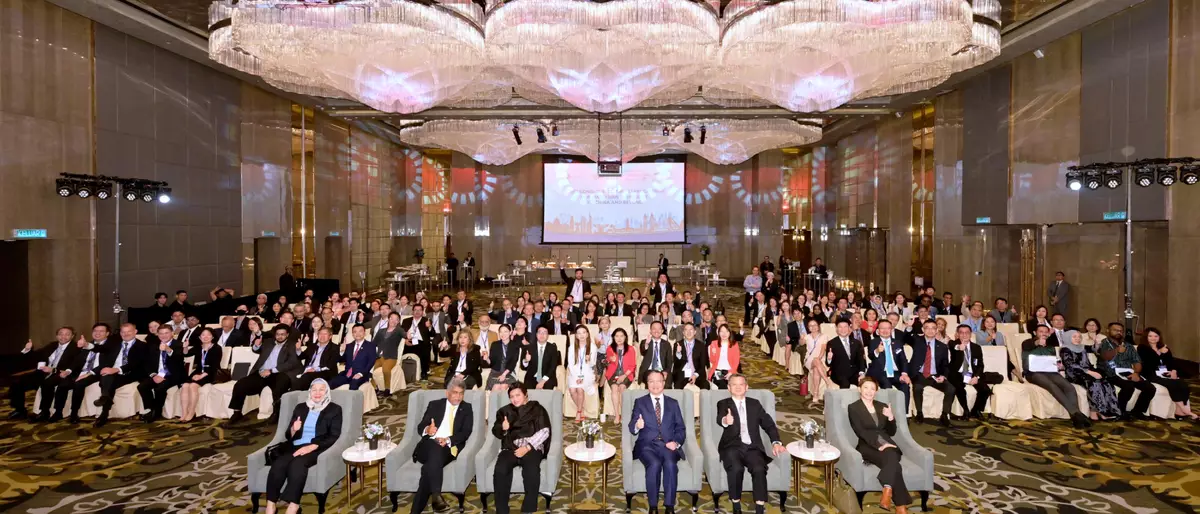
Keynote address by SJ at seminar titled Hong Kong: The Common Law Gateway for Malaysian Businesses to China and Beyond in Kuala Lumpur, Malaysia Source: HKSAR Government Press Releases
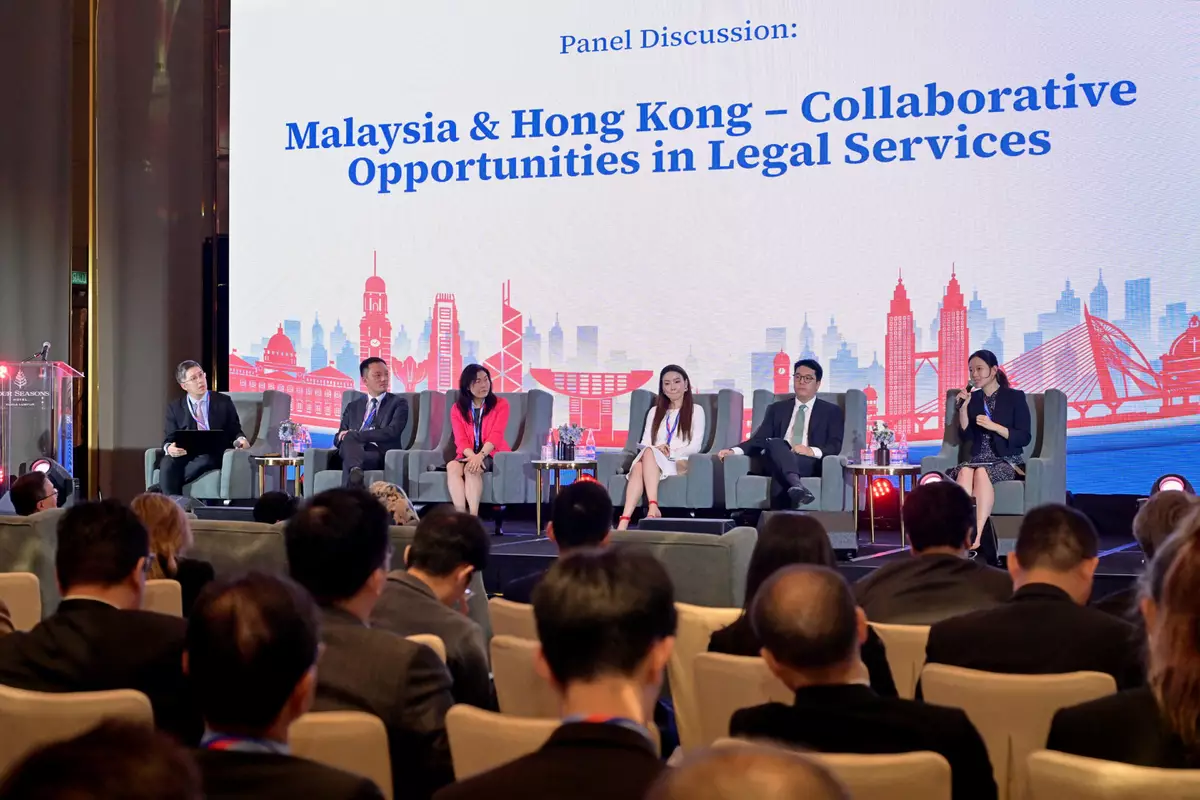
Keynote address by SJ at seminar titled Hong Kong: The Common Law Gateway for Malaysian Businesses to China and Beyond in Kuala Lumpur, Malaysia Source: HKSAR Government Press Releases
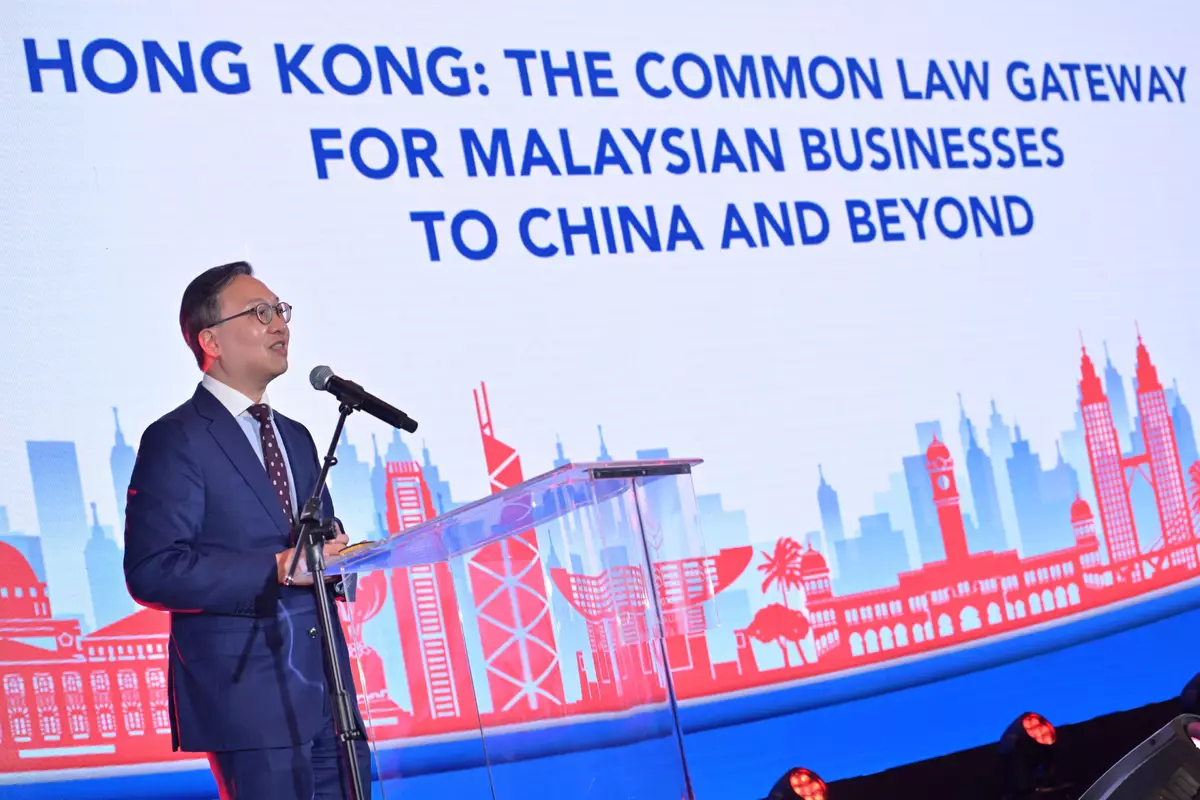
Keynote address by SJ at seminar titled Hong Kong: The Common Law Gateway for Malaysian Businesses to China and Beyond in Kuala Lumpur, Malaysia Source: HKSAR Government Press Releases


